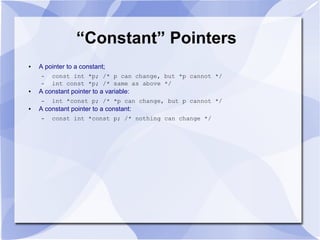Pointers point to memory addresses that store values. There are different types of pointers for different data types like integers, characters, and doubles. Pointers can be initialized using the address-of operator (&) and dereferenced using the asterisk (*) operator to access the value stored at a memory address. Memory for pointers must be dynamically allocated using functions like malloc() and freed using free() to avoid memory leaks. Pointers allow passing arguments by reference so functions can modify values.
















![Pointers to Blocks of Pointers
● Memory-allocating functions can allocate memory for pointers to other blocks:
– int **table;
– table = malloc (sizeof (int*) * 100); /* a table of 100 integer
pointers */
– for (i = 0; i < 100; i++)
– table[i] = malloc (sizeof (int) * 256); /* each pointer, in
turn, points to a block of 256 integers */
–
– /* Did I tell you that C does to define variables only before the
first executable statement of a function? */
–
– int *q = table[0]; /* the address of the first block */
– int c = table[0][0]; /* the value at the beginning of the first
block */](https://image.slidesharecdn.com/c2-160419180255/85/C-for-Java-programmers-part-2-17-320.jpg)